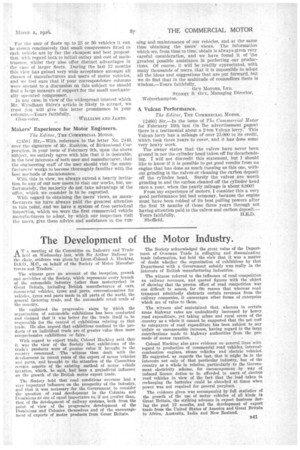The Development of the Motor Industry.
Page 25

If you've noticed an error in this article please click here to report it so we can fix it.
161T a meeting of tho Committee on Industry and Trade
held on Wednesday last, with Sir Arthur Balbour in the chair, evidence was given by Lieut.-Colonel A, Hacking, D.S.O., M.C., on behalf of the Society of' Motor Manufacturers and Traders.
The witness gave an account of the inception, growth and activities of the Society, which represents every branch of the automobile industry (other than motorcycles) in Great Britain, including British manufacturers of cars, commercial vehicles, tyres and parts, concessionnaires for vehicles, tyres and parts made in all parts of the world, the general factoring trade, and the automobile retail trade of the country.
He explained the progressive steps by which the organization of automobile exhibitions has been conducted and claimed that it was better for the trade itself to be responsible for the control of exhibitions relating to that trade. He also argued that exhibitions confined to the products of an individual trade are of greater value than more comprehensive exhibitions or fairs.
With regard to export trade, Colonel Hacking said that it was the view of the Society that exhibitions of the trade's products were of greater value if brought to the country concerned. The witness then dealt with the development in recent years of the export of motor vehicles and parts, and brought to the attention of the Committee certain aspeets of the existing method of motor vehicle taxation, which, he said, had been a prejudicial influence on the growth of the British motor export trade.
The Society held that road conditions overseas had a very important influence on the prosperity of the industry, and that it was necessary for the. Government to consider the question of road development in the Colonies and Dominions as one of equal importance to, if not greater than, that of the development of railway systems, both from the point of view of the progressive development of the Dominions and Colonies themselves and of the encouragement of exports of motor products from Great Britain. The Society acknowledged the great value of the Department of Overseas Trade in colleting and disseminating trade information, but held the view that it was a matter of doubt whether the organization of exhibitions by that Department with a Government subsidy was really in the interests of British manufacturing industries.
The witness referred to the influence of road competition on railway revenues, and quoted figures with the object of showing that the precise effect of road competition was one difficult to assess, for the reason that whereas road transport admittedly abstracts certain revenues from the railway companies, it encourages other forms of enterprise which are of value to them.
The witness alse maintained that, whereas in certain areas highway rates are undoubtedly increased by heavy road expenditure, yet taking urban and rural areas of the country as a whole it cannot be suggested that the net cost to ratepayers of road expenditure has been subject to any unfair or unreasonable increase, having regard to the large contributions made to highway authorities from the proceeds of motor taxation.
Colonel Hacking also gave evidence general lines with
regard to production of commercial road vehicles, internalcombustion engines, steam vehicles and electric vehicles. He suggested, as regards the last, that it might be in the interests not only of that particular industry, but of the country as a whole in relation particularly to the Government electricity scheme, for encouragement by way of reduced licence duties to be afforded to users of electric road vehicles in view of the fact that the load taken in recharging the batteries could be absorbed at times when
power was not required for general purposes. .
The evidence given was accompanied by full statistics of the growth of the use of motor vehicles of all kinds ill Great Britain, the striking advance in export business during the past 12 months, and the development of export trade from the United States of America and Greet Britain to Africa, Australia, India and New Zealand.




























